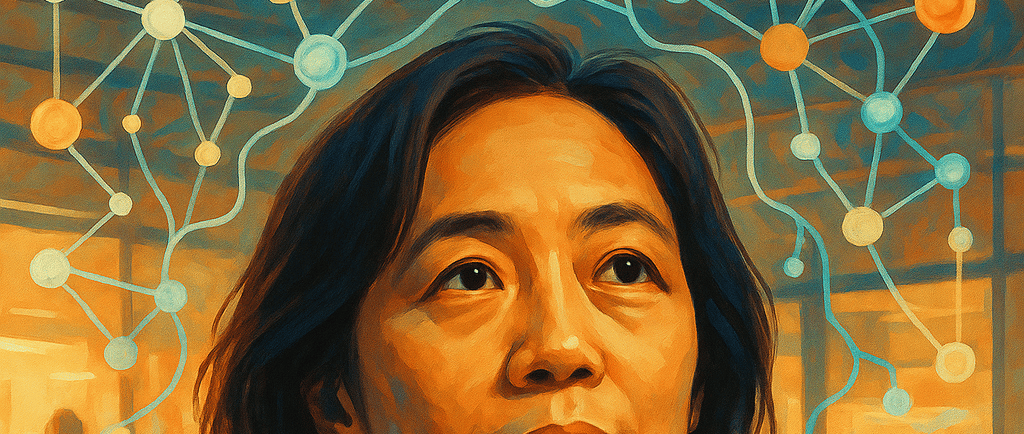
Your Constraints Are Your Competitive Advantage
What Fei-Fei Li's Story Teaches New Students
Shane Brown
8/20/20255 min read


Your Constraints Are Your Competitive Advantage: What Fei-Fei Li's Story Teaches New Students
You think you're starting from behind. Your family doesn't work in tech. You don't have connections at Google. You're learning to code while working part-time jobs. You're worried about student loans. You look at successful people in AI and think their path is impossible to replicate.
Fei-Fei Li would disagree. And her story proves why your constraints might be your biggest advantage.
When Disadvantage Becomes Your Superpower
Li arrived in New Jersey from China at 15. Her family squeezed into a one bedroom apartment. While her Princeton classmates studied physics full time, she ran her family's dry cleaning business every weekend for seven years. She was the only one fluent enough in English to handle customers.
Most people would see this as a massive disadvantage. Li saw it as training.
Running that business taught her project management, customer service, resource allocation, and crisis handling. She learned to balance competing priorities under pressure. She developed the ability to translate between different worlds and different languages.
These skills became the foundation of her later success.
Your part-time job isn't holding you back from your real career. It's preparing you for it. Every challenge you're facing right now is building capabilities that privileged students don't get to develop.
The Art of Seeing What Others Miss
In 2006, while established AI researchers focused on building better algorithms, Li asked a different question: What if the problem isn't the algorithm? What if the problem is the data?
This insight led to ImageNet, the dataset that revolutionized computer vision. But here's what matters for you: Li succeeded because she was willing to question assumptions that everyone else accepted.
Your outsider perspective is an asset. You haven't been in the field long enough to accept "that's just how things work." You haven't internalized the limitations that experts take for granted.
Use this. When professors explain how something works, ask why it has to work that way. When you read research papers, ask what problems they're not addressing. When you see successful products, ask what needs they're missing.
The next breakthrough will come from someone who sees what everyone else is overlooking.
Building With What You Have
Li didn't have access to massive computing resources when she started ImageNet. She didn't have a team of PhD students or unlimited funding. She had to be creative.
She partnered with other researchers who had complementary resources. She used Amazon's Mechanical Turk platform for crowdsourced labeling. She made the dataset free so other researchers would help improve it.
This teaches you something crucial: you don't need perfect resources to build something impactful. You need to be resourceful.
Start building now with what you have. Use free cloud credits. Participate in open source projects. Join online communities. Find study groups. Collaborate with classmates on side projects.
The skills you develop working around constraints will serve you better than having unlimited resources from day one.
Your Diversity Is Your Differentiator
Li noticed something troubling about AI development: it was dominated by a narrow group of people. This wasn't just unfair. It was strategically dangerous. AI systems built by homogeneous teams would miss problems that affected diverse populations.
She founded AI4ALL to bring underrepresented students into AI education. The program proved something important: talent is distributed everywhere, but opportunity is not.
If you're from a background that's underrepresented in tech, you're not behind. You're bringing perspectives that the field desperately needs.
Your different background means you see problems others miss. You understand user needs that others overlook. You ask questions that others don't think to ask.
Don't try to fit in. Stand out. The field needs what you bring to it.
From Student to System Changer
Li didn't just become a successful researcher. She changed how the entire field works. ImageNet didn't just solve her research problem. It accelerated progress for thousands of other researchers.
This mindset matters for your career: think beyond your individual success. Ask how your work creates value for others. Look for ways to lift up your community while advancing your own goals.
Share your projects openly. Write blog posts about what you're learning. Contribute to open source projects. Mentor other students. Build tools that help your classmates.
The most successful people don't just climb ladders. They build ladders for others to climb.
The Long Game: Patience and Persistence
Li spent years building ImageNet before anyone understood its importance. Many colleagues thought it was a waste of time. Why focus on data collection when the exciting work was in algorithms?
She persisted because she believed in her vision. The vindication came in 2012 when AlexNet used ImageNet to achieve breakthrough results in image recognition.
Your career will have similar moments. You'll work on projects that seem unimportant. You'll pursue ideas that others don't understand. You'll invest time in learning skills that don't immediately pay off.
Trust the process. The most impactful work often looks like a detour before it looks like a breakthrough.
From Academic to Industry and Back
Li moved between Stanford, Google Cloud, and back to Stanford. She translated research into products, then brought industry insights back to academia. She didn't follow a linear path.
This teaches you to think flexibly about your career. You don't have to choose between research and industry, between technical work and leadership, between solving immediate problems and pursuing long-term visions.
The most successful careers combine multiple perspectives. Seek internships in different types of organizations. Work on projects that span academic research and practical applications. Build bridges between different communities.
Your Action Plan for Getting Started
Stop waiting for permission or perfect conditions. Start building now:
Pick a problem you care about. Find something that affects you or your community. Technical skills matter, but passion for the problem matters more.
Start small but think big. Build simple projects that solve real problems. Document your process. Share your results. Iterate based on feedback.
Learn in public. Write about what you're learning. Share your struggles and breakthroughs. Connect with others working on similar problems.
Seek diverse experiences. Take classes outside your major. Work with professors from different departments. Collaborate with students from different backgrounds.
Question everything. Don't accept "that's just how it works" as an answer. Ask why things are designed the way they are. Look for assumptions to challenge.
Build your network horizontally. Connect with peers, not just professors or industry leaders. Your classmates will become your future collaborators, co-founders, and colleagues.
The Future Belongs to You
Li's latest venture, World Labs, focuses on spatial intelligence, teaching AI to understand three-dimensional environments. She's not following trends. She's creating the next wave of innovation.
You have the same opportunity. The problems you'll solve in your career don't exist yet. The technologies you'll use haven't been invented. The companies you'll work for or start haven't been founded.
Your job isn't to catch up to where the field is now. Your job is to help define where it goes next.
Your Constraints Are Your Curriculum
Every challenge you're facing right now is teaching you something valuable:
Working while studying teaches time management and prioritization. Coming from a non-tech background teaches translation and communication skills. Having limited resources teaches creativity and resourcefulness. Being different teaches you to see opportunities others miss.
Li's immigrant experience, family business background, and outsider perspective weren't obstacles to overcome. They were advantages that shaped her unique approach to AI research and leadership.
Your background isn't holding you back. It's preparing you for problems that others won't know how to solve.
The field of AI needs people who understand that technology exists to serve humans. It needs people who ask different questions, see different possibilities, and care about different outcomes.
It needs people like you.
Start building. Start sharing. Start contributing. The future of AI depends on it.
